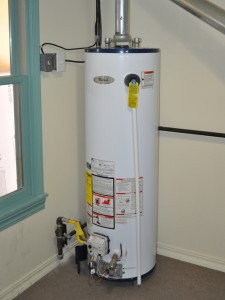[northwest_breadcrumbs]
Hannah Barney
5 Factors to Consider When Purchasing a New Water Heater
So you’ve finally decided that it’s time to retire that old water heater, but now you’re left wondering how you go about choosing your new one. It’s a big investment to consider, though it’s also one that is going to make an immediate difference to your home and your family.
Here are 5 Factors to consider when purchasing a new water heater:
-
How much water does your family use on a daily basis?
- Consider # of family members. Typical individual uses 20-30 gallons of hot water daily.
- FHR (first hour rating) – this well help determine how well the unit will operate during a busy time period. Look at the total BTU load of all of the appliances in your home that could be running at the same time (ie. shower(s), dishwasher, laundry, hot tub, etc.)
- GPM (gallons per minute rating) –how many gallons of water can be filled per minute. The less water used per minute, the higher the water temperature achieved can be.
-
How much space do you have for this new unit?
- A standard size water heater is 40 gallons. While the unit itself does not need much space around it in order to be functional, you do need to make sure there is adequate space for someone to come in and service it.
- Reminder: In 2015, the size of ALL water heaters was increased both in width and height due to federal regulation. In other words, any new unit that you decide to purchase will be larger than your previous one and will require more space.
- Options for smaller spaces: Short or tall units, depending on how the space is limited
-
What type of heater do you currently have?
- Storage – still remains the most common residential unit. Not considered the most energy efficient unit due to the heat loss in the tank, but newer options have much better efficiency ratings than previous models.
- On Demand or Tankless – can decrease your energy usage by 20 to 30 percent. Basically you never run out of hot water, however you may be disappointed by the low flow rate. These units will only work at optimal level with proper sizing for your family and your home, especially if your family plans on using several hot water sources at the same time.
- Heat Pump – can either buy a unit with built in storage, or as an add-on for an existing tank. High upfront cost, needs a lot of space and should be placed in a warmer area (not cold space).
-
How will the water be heated up?
- This may depend on what you already have. If you are not happy with your current heating method, you will have to consider the budgeting options for changing to a new one.
- Is it heated up by gas, oil, or electricity?
-
How much are you looking to save?
- Strongly considering how efficient of a unit you want is an important part of this decision. Because there is going to be a bigger upfront cost, you do need to decide how much you truly want to save. The savings will not be immediate, but will make a difference over time.
- Energy Star Rating: The more stars a system has, the more energy you will save
- Energy Factor (EF): The higher the EF, the more efficient your unit

These guidelines are meant to help assist you in your decision making process for your new water heater. However, we always recommend that you get a professional opinion to ensure you have the best type of unit available for your home. Our qualified technicians would be more than happy to help you find that perfect water heater, as well as install it for you!
